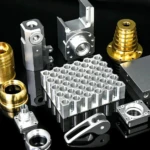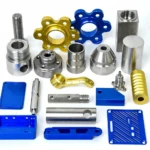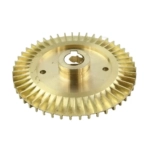With the rapid development of technology, CNC machining centers have become an important part of modern manufacturing. These sophisticated machines revolutionize the way we produce precise parts, enabling the industry to achieve high levels of accuracy, efficiency and productivity. In this article, we will dig into the world of CNC machining centers working, exploring the various roles and responsibilities involved in operating and maintaining these complex machines.
CNC machining centers are computer-controlled machines that perform specific tasks such as cutting, drilling and milling using pre-programmed instructions. These machines are commonly used in the aerospace, automotive, medical and consumer goods industries, and accuracy and accuracy are crucial. The growing demand for complex parts and components has led to a surge in CNC machining center work, creating new opportunities for skilled professionals.
One of the main roles of the CNC machining center is a mechanic. The mechanic is responsible for setting up and operating the CNC machine to ensure it runs smoothly and produces high-quality parts. They must have a deep understanding of machine tools, programming languages and materials science, and excellent problem-solving skills. The mechanic must also be able to interpret engineering drawings, blueprints, and specifications to ensure that the parts are manufactured with strict standards.
Another key role in CNC machining centers is CNC programmers. CNC programmers are responsible for creating and editing programs to control the movement and movement of the CNC machine. They must have a solid foundation in mathematics, geometry and computer programming, as well as CNC programming languages such as G code and M-Code. CNC programmers must also be able to optimize programs for efficiency, accuracy, and productivity.
In addition to mechanics and CNC programmers, the CNC machining center also hires quality control inspectors, maintenance technicians and engineers. The quality control inspector is responsible for verifying that the parts meet specifications and standards, while the maintenance technician ensures that the machine is properly maintained and repaired. On the other hand, engineers oversee the entire manufacturing process, from design to production, and are responsible for troubleshooting and optimizing machine performance.
There are many benefits to working in a CNC machining center. First, CNC machining center jobs provide competitive salary and benefits, as well as opportunities for career development and career development. Furthermore, working in a CNC machining center may make sense as professionals have the opportunity to engage in complex and challenging projects and contribute to the creation of innovative products and technologies.
In summary, CNC machining center work is highly skilled and highly rewarding, providing professionals with the opportunity to engage in complex and challenging projects and contributing to the creation of innovative products and technologies. With the growing demand for precise parts and components, CNC machining centers are likely to continue to play a vital role in modern manufacturing, creating new opportunities for skilled professionals.
FAQ:
Q: What is a CNC machining center?
A: The CNC machining center is a computer-controlled machine that uses pre-programmed instructions to perform specific tasks such as cutting, drilling and milling.
Q: What is the main role of the CNC machining center?
A: The main roles of the CNC machining center include mechanics, CNC programmers, quality control inspectors, maintenance technicians and engineers.
Q: What skills and qualifications are required to work in a CNC machining center?
A: CNC machining center jobs require a range of skills and qualifications, including experience in mechanical tools, programming languages and materials science, as well as excellent problem-solving skills and attention to detail.
Q: What are the benefits of working in a CNC machining center?
A: The benefits of working in a CNC machining center include competitive salary and benefits, opportunities for career development and professional growth, and opportunities to engage in complex and challenging projects.
Q: Which industries use CNC machining centers?
A: CNC machining centers are often used in the aerospace, automotive, medical and consumer goods industries, and accuracy and accuracy are crucial.
Q: How do I start working from the CNC machining center?
A: To start working from a CNC machining center, you can pursue a degree or certificate in a related field (such as mechanical engineering or machining technology) and gain experience through an internship or apprenticeship. You may also consider working with professional recruiters or job placement agencies specializing in CNC machining centers.



















